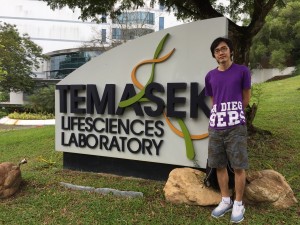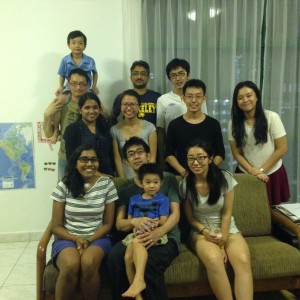Journey to the East: from San Diego to Singapore
Posted by tnheok, on 18 July 2016
Axons in mature nervous systems regenerate poorly after injury, creating a major obstacle for recovery from neuronal injury. We know, however, that their regenerative capabilities are affected by both cell-extrinsic and intrinsic factors. Understanding these processes is crucial to provide future therapeutic intervention for neuronal regeneration. We recently found a cell-intrinsic factor inhibiting axon regeneration in a large-scale genetic screen. Several lines of evidence suggest that the activity of this factor is regulated by phosphorylation. Having spent a year as a post-doc in UC San Diego, working on the genetic side of the project, I decided to make a collaborative visit to the laboratory of Dr. Fumio Motegi (Temasek Life Sciences Laboratory, Singapore) to biochemically test our hypothesis.

I am grateful to the journal Development and Company of Biologists for the generous support to make the trip possible. I had a successful trip to Singapore and have some great memories working in a friendly lab in Singapore. With very kind guidance and help from the lab members, I have learnt several useful techniques such as in vitro protein purification and in vitro kinase assay. Together, we have tested several kinase candidates and are starting to have some clues on how we should advance in this project.

This trip has also allowed me to make new connections with different research groups in Singapore. During my visit in Singapore, I presented my work in the Singapore Worm Club and attended a number of seminars to get to know what other groups are working on. I also visited several institutes in Singapore, including the Mechanobiology Institute and Lee Kong Chian School of Medicine. I was very impressed with the high standard of research conducted and outstanding facilities provided in these institutes. Importantly, by sharing my research work with others, I have found a few interesting people who may turn out into close collaborators in the future.
In conclusion, this travel fellowship has given me the chance to experience research in Singapore. I have not only learnt techniques that are useful for my project, but have also made many new friends in Singapore. I would like to encourage other young scientists to look out for opportunities to experience research in different countries. Finally, I would like to thank the Company of Biologists for awarding me the fellowship.


 (3 votes)
(3 votes)